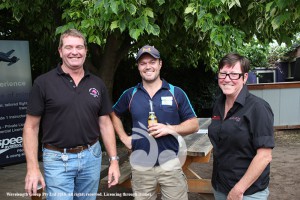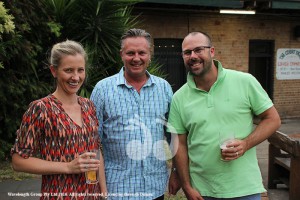Business Positive About Bypass
LAST week the Scone Chamber of Commerce met to discuss how they can come together as a business community to face the bypass.
Chris Lavis, owner of Home Timber and Hardware in Scone, Muswellbrook and Branxton shared his experience about how their business not only survived, but thrived after the Branxton bypass.

Sean Constable with guest speaker Chris Lavis and Vickie Asara at the Chamber of Commerce drinks at the Belmore Hotel.
“We were trading up 8 percent more after the bypass going through, which doesn’t seem like much but considering we also had a Masters and a Bunnings open up within 20 minutes from us so with that in mind it’s incredible to be able to do that and have growth,” said Mr Lavis.
“You do loose some passing trade, but they need to be realistic about how much passing trade they are getting and rethink what their core business is and in most circumstances I think they’ll find they need to have a hard look at their business and be willing to transition and that’s the key you have to look at how you will transition,” he said.
“If you focus on attracting more locals you won’t have to rely on the passing trade as much,” he said.
A study conducted by the University of New South Wales for the Roads and Maritime Services showed after a bypass townships with a population under 2,500 suffered economically, while towns with populations greater than 2,500 benefited, with medium sized towns rather than the larger towns reaping the most benefits.
The study found townships which created a more pedestrian friendly environment in their main streets saw more local people spend more time at local businesses, something Chris Lavis said he saw occur in Branxton.
“It is about making the town and the main street an easy access place, a family friendly, nice, laid back and relaxed atmosphere so that people want to spend more time there,” said Mr Lavis.
“Branxton was a town with a population of 2,000 so it was on that boarderline but even myself, my shop was across the road from the bakery and I’d stand there at times looking to cross the road to grab something for lunch and you literally can’t cross the road so you turn around and walk back into the shop and have dried saos for lunch instead,” he said.
“Whereas now businesses like the bottle shop and bakery are still very busy with the passing trade and we have a transfer station for caravans but it is a very nice a relaxed town now where we do find people will park in the main street and they’ll do more of their shopping locally; there are definitely more people spending longer in the town,” he said.
A key to a business thriving post bypass is also how the owners prepare for the transition.
“There was a perfect example of a bakery and a take away shop next to it in Branxton and the take away transitioned straight away they changed their menu, changed their opening hours, put some seating outside and it went from a business before the bypass where nobody wanted to buy it to booming after the bypass, whereas the bakery they didn’t do anything different, they just kept their business as it suffered after the bypass; they then changed some things like the take away shop had done and they are now running a successful shop and have opened a second shop in Huntlee,” said Chris.
“You’ve got to cater to the locals, serve the locals and you’ll generate a loyal client base every week, every day,” he said.
Chris said there were plenty of examples in other towns for how businesses can succeed after a bypass and said it was crucial all businesses unite and be proactive about the change.
“There is often so much energy that can be used trying to fight these things and arguing over the details, but we went into it with the attitude of it’s happening and let’s not waste any time trying to fight it let’s try and get what we need as a business community and as a town and be united,” he said.
“The only way you ca do that is to be positive about the transition,” Chris Lavis said.
 scone.com.au
scone.com.au